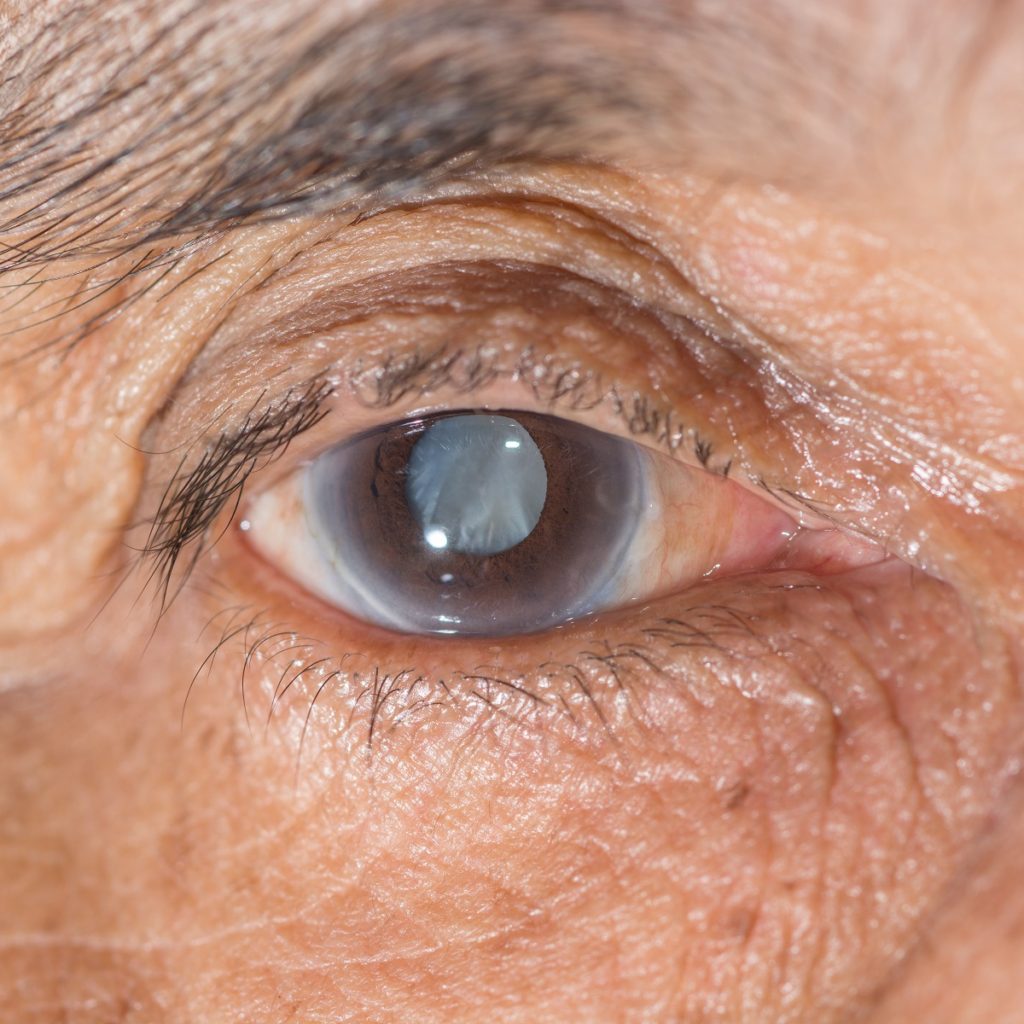
The term “cataract” refers to a condition in which the naturally clear lens of the eye gradually becomes clouded and opaque. Proteins in the eye’s natural lens clump together to form these cloudy areas. This interferes with light passing through the eye’s lens to the retina.
Cataracts can affect people of all ages, although they occur the most often in people aged 65 and up. The condition usually occurs in both eyes, but they often form at different rates.
Symptoms of Cataracts
Common symptoms of cataracts may include:
- Light sensitivity
- Blurred or fuzzy vision
- Poor contrast
- Colors appear faded or muted
- “Halos” around lights
Patients with advanced cataracts often describe the condition as if they’re looking through a waterfall or wax paper.
Cataracts can lead to major vision loss if left untreated. Cataract surgery is necessary for patients who have experienced loss of vision as a direct result of the condition’s advancement. This eye surgery is performed about 3 million times each year in the United States, according to the American Society of Cataract and Refractive Surgery.
Causes of Cataracts
There are a number of possible causes of cataracts, including the following:
- Age
- Eye trauma
- Heredity
- Some medications including long-term use of oral steroids
- Diabetes
- Ultraviolet radiation
- Smoking
- Glaucoma
- Certain metabolic conditions
Age a Leading Factor In Cataracts
Age is the most common cause of cataract development. In fact, 50 percent of people over the age of 60 suffer from cataract development. Almost everyone will develop cataracts at some point as they age.
The possible underlying causes of age-related cataracts that researchers are studying include:
- The presence of oxygen-free radicals
- A decrease in glutathione
- UVA and UVB radiation
- Electromagnetic waves
- Radiation treatments
Exposure to UVB radiation over a long period of time can change the lens of the eye and cause cataracts. UVA radiation has been linked to increased oxidation.
Chemotherapy and other radiation treatments used for cancer may also contribute to the development of cataracts. Exposure to low radiation levels from computer screens has not been shown to cause cataracts. However, scientists recommend sitting about 1 foot away from them.
Some Medications Can Cause Cataracts
The use of oral corticosteroids, such as prednisone, for a prolonged period of time has been known to cause cataracts. Other medications may also contribute to the development of cataracts.
However, the use of statin drugs to treat high cholesterol has actually been associated with a lower risk of developing certain types of cataracts.
Diseases and Injuries Can Be A Factor
Certain systemic diseases can lead to an increased risk of cataract formation. People seeking help for this condition should keep these underlying causes of cataracts in mind.
People who suffer from a condition known as uveitis, or chronic eye inflammation, also face a much higher risk for developing cataracts. Uveitis usually occurs in people with autoimmune disorders. Diabetics and patients with glaucoma are also much more likely to develop cataracts.
Another contributing factor is trauma to the eye due to injuries. Previous trauma or injuries can cause cataracts in some cases up to 20 years after the event.
Cataract Prevention
There is no guaranteed way to prevent or slow the progression of cataracts. But there are ways you can try to minimize your risk.
- Get regular eye exams
- Eat a healthy diet that includes lots of fruits and veggies
- Wear sunglasses
- Quit smoking
- Reduce alcohol use
Frequently Asked Questions About Cataracts
How long does it take to recover from cataract surgery?
Most people have a very quick recovery from cataract surgery and are able to go back to their normal activities the next day.
What happens if you blink during cataract surgery?
This is a common concern. Fortunately, it is not possible to blink during cataract surgery. After your eyes have been numbed by drops, an eyelid holder will be used to keep you from blinking.
Can I get cataracts again after having surgery to remove them?
Cataracts occur when the lens of the eye becomes clouded. During cataract surgery, the cloudy lens is removed and replaced with a clear artificial one. Because the entire lens is removed during the procedure, there is no tissue remaining that could become clouded again. For this reason, patients who have had cataract surgery do not have to worry about the condition returning in the future.
Schedule a Cataract Surgery Consultation Today
If you think you might be suffering from cataracts, the experienced Houston cataract surgeons at Berkeley Eye Center can help. Listen and watch the cataract testimonials from some of our happy patients. Call 713-526-1600 today to schedule your cataract evaluation at Berkeley Eye Center today.
